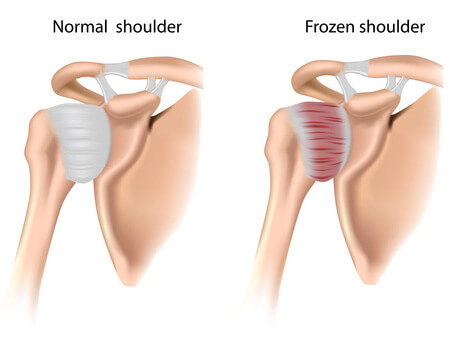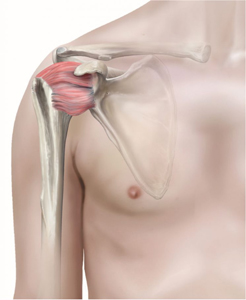Dr. Biplab Dolui
MS (Orthopaedics), AFTS Fellow (Paris), Consultant Arthroscopist, Joint Replacement & Trauma Surgeon
MS (Orthopaedics), AFTS Fellow (Paris), Consultant Arthroscopist, Joint Replacement & Trauma Surgeon
Frozen shoulder is a condition that affects your shoulder joint. It usually involves pain and stiffness that develops gradually, gets worse and then finally goes away. This can take anywhere from a year to 3 years.
Your shoulder is made up of three bones that form a ball-and-socket joint. They are your upper arm (humerus), shoulder blade (scapula), and collarbone (clavicle). There’s also tissue surrounding your shoulder joint that holds everything together. This is called the shoulder capsule.
With frozen shoulder, the capsule becomes so thick and tight that it’s hard to move. Bands of scar tissue form and there’s less of a liquid called synovial fluid to keep the joint lubricated. These things limit motion even more.

Causes
• The shoulder is made up of three bones: The shoulder blade, the collarbone, and the upper arm bone, or humerus.
• The shoulder has a ball-and-socket joint. The round head of the upper arm bone fits into this socket.
• Connective tissue, known as the shoulder capsule, surrounds this joint. Synovial fluid enables the joint to move without friction.
• Frozen shoulder is thought to happen when scar tissue forms in the shoulder. This causes the shoulder joint's capsule to thicken and tighten, leaving less room for movement. Movement may become stiff and painful.
• The exact cause is not fully understood, and it cannot always be identified.
• However, most people with frozen shoulder have experienced immobility as a result of a recent injury or fracture.
• The condition is common in people with diabetes.
Symptoms
Frozen shoulder typically develops slowly, and in three stages. Each stage can last a number of months.
• Freezing stage - Any movement of your shoulder causes pain, and your shoulder's range of motion starts to become limited.
• Frozen stage - Pain may begin to diminish during this stage. However, your shoulder becomes stiffer, and using it becomes more difficult.
• Thawing stage- The range of motion in your shoulder begins to improve.
For some people, the pain worsens at night, sometimes disrupting sleep.

Risk factors
Common risk factors for frozen shoulder are:
• Age: Being over 40 years of age.
• Gender: 70 percent of people with frozen shoulder are women.
• Recent trauma: Surgery or and arm fracture can lead to immobility during recovery, and this may cause the shoulder capsule to stiffen.
• Diabetes: 10 to 20 percent of people with diabetes develop frozen shoulder, and symptoms may be more severe. The reasons are unclear
Other conditions that can increase the risk are:
• stroke
• hyperthyroidism, or overactive thyroid
• hypothyroidism, or underactive thyroid
• cardiovascular disease
• Parkinson's disease
